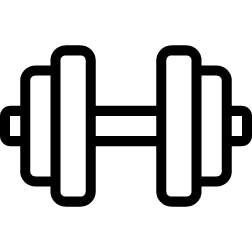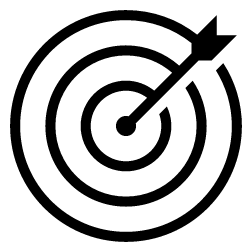Job Application Cover Letters
After reading these notes—at the least—you should
- understand the purpose of a cover letter
- know how to approach your cover letter rhetorically, by
- tailoring your content and language to the job advertisement, the reader, and the business
- demonstrating your qualifications for the position
- understand the basic organization and content of a cover letter, including
- an introductory paragraph that provides context
- body paragraphs that highlight and expand on (or “prove”) important items from your resume; discussing specific experiences, results, successes
- a closing paragraph that directly asks for an interview
Every year, one or two students in my professional writing classes find a cover letter template (or cover letter example/sample) online somewhere. Usually, it’s one of the formulaic, fill-in-the-blanks templates with most of the content already written. The student plugs in her or his preferred job title, degree and university, and contact info, and submits this modified template/example as their cover letter.
You may not do this. You may not use a cover letter example, sample language, or template. You may not “borrow” generic or specific phrasing from online.
The project asks you to WRITE job search related documents. By “WRITE,” I mean that you must find your own language, write rhetorically, and tailor your cover letter to match the job advertisement. Your cover letter is supposed to make a case for why you are qualified for the position, why you are an excellent candidate, what you could contribute, and why the company would be lucky to have you. You can’t do any of those things by using a generic template. You have to do it yourself.
If you use a template, use a fill-in-the-blank sample, use a cover letter generator, borrow phrasing or sentences, or try to game the system some other way, you will get a 0% on the Job Search Portfolio project.
Don’t do it.
Overview
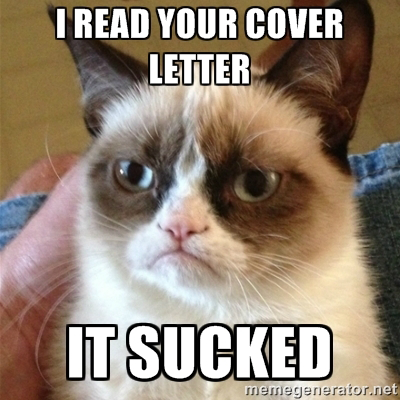
A well-written cover letter is an opportunity to present yourself well and influence a recruiter, so always take full advantage of that opportunity. A cover letter can also be viewed as your first conversation with a future employer, so be sure to make an excellent first impression.
Your cover letter should be engaging, informative, and show your command of the written word. It should flow easily from a reader’s perspective, making the connection between the job opportunity and your ability to succeed in the position. The tone should be compelling (and professional). You should be excited about the opportunity and you should project confidence about your ability to meet (and exceed) the requirements of the position.
In the context of applying for a job, there are two types of cover letters (also called application letters).
solicited cover letter
A solicited cover letter is appropriate in situations where a company IS seeking applications. The company has openings for positions advertised online or in print, or positions an applicant may find out about through networking or word of mouth, or from a recruiter or headhunter.
unsolicited cover letter
An unsolicited cover letter can be used in situations where a company IS NOT seeking applications — but an applicant wants to try to secure a position anyway. Unless there are extreme and compelling reasons to seek employment at a company that isn’t currently hiring, sending an unsolicited cover letter (and unsolicited application) is generally a bad idea.
Since you have already found job advertisements around which to frame the other documents required for the Job Search Project Portfolio (resume, cover letter, interview question responses, and thank you/follow-up letter), obviously, you’ll be writing a solicited cover letter for this project.
Purpose
primary purpose
In the context of submitting a job application, the primary purpose of a cover letter is to get an interview.
The purpose of a cover letter IS NOT to get a job. Companies rarely hire employees without an interview, particularly for entry level positions or for unknown applicants (unknown in their industry and/or without a publically known record of employment successes). For that reason, your cover letter should be highlights and expansions of your work, volunteer, organizational, and educational history — those things that have prepared you to assume the position for which you are applying. You should not provide minute detail on your entire history, but enough to show that you are prepared for the position and enough to make an employer want to interview you.
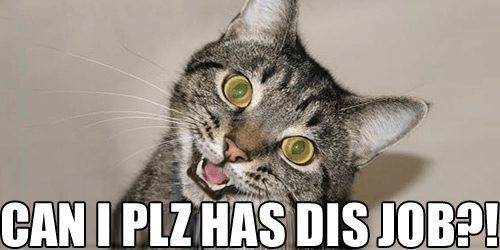
secondary purposes
The secondary purposes of a cover letter are to:
- introduce yourself and make a good first impression
- provide context for resume (transmittal letter)
- show your qualifications and prove you fulfill the requirements of the position
- expand on items in your resume
- identify what you’ll bring to position/company
- stand out from other candidates
- ask for/get an interview
- prove your writing skill
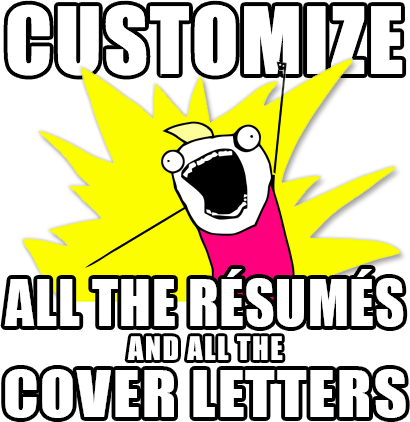
A Note About Tailoring Materials
The best candidates tailor all of their job search materials to individual positions open at specific companies. It doesn’t mean you have to start from scratch writing a new resume and cover letter for each job, but it does mean tailoring your materials to highlight particular skills and experiences that match the position description. This means any or all of the following
- reorganizing resume sections or items for emphasis (or demphasis)
- rephrasing verb (accomplishment) statements to match the position description/advertisement
- adding sections/items from your “master resume” that are relvant to the position
- deleting sections/items that are irrelevant to the position
- tailoring the language, tone, and attitude (your ethos) in your resume and cover letter to appeal to the company’s ethos
In short, the best candidates send different versions of their resumes and cover letters for each position they hope to interview for. Some changes may be slight, and some may be more substantive, but the guiding factor in revising and editing is highlighting yourself in such a way that shows you are qualified, prepared, and a good fit for the position and the organization.
Preliminary Work (Prewriting/Brainstorming)
Assuming you’ve already written/tailored your resume to match the position for which you are applying, take another look at the job advertisement. Go through it carefully, highlighting the skills, experiences, and requirements the employer is looking for in an employee. If possible, prioritize this list with what you believe are the most important items at the top of the list.
I recommend you take those most important items and make each the first line in a list. Below the skill, qualification, or experience, list items from your history (and from your resume) that demonstrate any of the following: how you’ve used it*, where you learned it, what success it has brought you or your organization, how it has benefited you, your organization, etc. (*where “it” = the skill, experience, qualification, knowledge set, etc.)
For example, if you detemine that among the top skills, abilities, or qualifications, a company is looking for is organizational skills, one of your lists might look something like this:
Organizational Skills
Internship, Organized Last Year’s Transactions
- In my last internship, I was asked to manually organize paper work for the past year’s real estate transactions.
- I was given two weeks to complete this, and all of the paper work was in approximately five boxes.
- I quickly reviewed the contents, which fit into four categories: (1) commercial, (2) private homes, (3) condos, and (4) incomplete transactions.
- I asked my manager to review this to make sure I was going in the right direction. He gave me the green light.
- I finished the project in one week, and I not only organized the files but also figured out how to make the entire process electronic for the future.
- As a result, my manager quickly focused on completing 25% of the outstanding transactions, adding ~$100K in the last half of the year!
VP of Sigma Tau Delta, English Honors Organization
- Two years ago, I made an Excel file with names, contact information, specializations, and post-graduation information (where they went after FAU, like grad school, companies, freelance, etc.)
- I created a shared dropbox with all of our organization’s official documents (constitution, bylaws, meeting minutes, advertisements for events, etc.), organized by year and/or type
- The membership list was helpful to the English department in compiling their annual newsletter to alumni and donors (both for the addresses of former members and for records about their successes after graduating with degrees in English from FAU)
- The shared dropbox will be used by future executive committees as a record of what we did, how we revised our documents, and to be used as templates for future documents (and the continuing success of the organization).
When you are done with your lists, go back to the job advertisement and see if you can pull specific words from the job description to use in your cover letter (and resume).
For example, if the job advertisement asks for the applicant to be “proficient in the creation and maintenance of electronic databases,”
|
instead of (brainstorming from list above)
|
revised language to better match the job advertisement
|
| I made an Excel file with names, contact information, specializations, and post-graduation information… | created and maintained a electronic database of current and former FAU English Honors students for… |
Another example, If the advertisement asks for someone who “takes independent initiative to solve problems and ensure efficiency”
|
instead of (brainstorming from list above)
|
revised language to better match the job advertisement
|
| I was asked to manually organize paper work for the past year’s real estate transactions…” and “I not only organized the files but also figured out how to make the entire process electronic for the future… | independently developed and implemented new procedures for digitizing real estate records, ensuring more efficient record keeping, eliminating problems with inconsistencies, and saving agents time better spent with clients… |
SEE ALSO:
Format & Conventions
As with most other business letters, your cover letter should look like a professional letter—it should have the recipient’s inside address, the date, a salutation, complimentary closing, and signature. It should be single spaced with a blank line between paragraphs, usually in block format.
Your cover letter should be about a page. There is no real rule for cover letter length, but for the purposes of the Job Search Portfolio project, you should aim for one page—please see the JSP Cover Letter FAQ, “Q. How long should my cover letter be?”.
Besides the guidelines for the Job Search Portfolio as an educational requirement, when you’re applying for jobs after graduation, you should still aim to write about a page—that page may be your only chance to persuade your employer to read your resume and decide to schedule an interview.
Organization
As most professional letters, a cover letter (or application letter) has three main sections: an introductory paragraph, a conclusion paragraph, and the body (which should be comprised of several paragraphs).
INTRODUCTORY PARAGRAPH:
In the introductory paragraph, you introduce yourself to the hiring manager or recruiter and show that you meet the minimum requirements for the job. Usually, the introductory paragraph should include five items:
-
- Why you are contacting them
- Be direct in saying that you’re applying for the position, and be specific in using the job title exactly as it’s written in the job advertisement (same title with same capitalization)
- Why you are contacting them
If you found the job listed on Google Jobs, Indeed, LinkedIn, or a similar website, try to find the position listed on the company’s website. If so, refer to the company’s website as “how you heard about the position.” It’s better to suggest you read the listing on the their website than a massive general job posting website. This suggests you were looking for a job with this particular company and/or suggests you are knowledgeable about the company. (see more)
- How/Where you heard about the position
- If someone referred you, mention the name of your contact
- If you found out about the position online, mention the website and cite the advertisement ID, position number, or job code
- Usually (almost always for advertisements with larger organizations), there is a numerical code or ID number associated with the position/listing. Sometimes this number is listed right on the job advertisement. If not, look in the job advertisements URL.
- Whether you are still in school (if so, include your major/degree program and anticipated graduation date) or working in your career field (if so, include your position title and employer)
- If you’re not in school or working, you can include your most recent career or educational experience
- (briefly) How your skills, qualifications, education, and/or experience make you a good candidate for the position
- Why you are interested in the position
BODY PARAGRAPHS:
Some options…
hierarchical: organization by order of importance; usually with minimum requirements first, then moving from most important skills, experiences, and qualifications to least important
logical/generic: organization by typical order of generic resume sections; usually education, experience, skills, and awards
chronological: organization from past to present or from present to past
based on job ad: organization based on order of requirements, preferences, skills, etc. as listed in job advertisement
The body of the cover letter makes the case for why you’d be an exceptional hire for the position.
Unless there is a compelling reason for atypical organization, generally, cover letter body paragraphs should each focus on a particular strength, skill, knowledge set, etc. For each, include your best examples of how you’ve demonstrated the strength and some exultation of results (in other words, the positive effects or outcomes).
While you will need to make conscious rhetorical decisions about how best to write your strengths and appeal to the audience, you can use this four-part organizational pattern as a starting point. When discussing a strength, consider mentioning each of the following:
- Context: the specific experience or context where you gained or use the skill
- Skill: the skill itself, written in the language of the job advertisement
- Proof/Outcome: if possible, proof that you possess the skill (or some statement about results, outcomes, or benefits)
- Appeal to Reader: reader-centered appeal to the audience indicating how you would use the skill in the advertised position to benefit the organization
An example:
| Context: | Four months experience working with Boca Media & Publishing as an Internet Marketing intern |
| Skill: | Taught me to identify stories of interest in local news as potential marketing opportunities, write engaging blog articles, Facebook posts, and tweets, and engage members of the community |
| Proof/Outcome: | Examples of my articles, posts, and tweets are available in my online portfolio |
| Appeal to Reader: | This experience has prepared me to identify marketing opportunities for which to write media that will engage [Company Name’s] target demographic and create excitement around each month’s new releases |
Another example:
| Context: | While serving as the English graduate student association’s treasurer for two years |
| Skill: | I maintained a balance budget, predicted financial needs, collected dues, and ensured timely payment of goods, space, and services for a variety of guest speakers, creative writing readings, and academic events |
| Proof/Outcome: | I am particularly proud of working with vendors to cut space and equipment costs by 25% in my second year which enabled EGSS to provide two additional events that were well attended and well received by English department faculty and students |
| Appeal to Reader: | My ability to clearly communicate our organization’s needs and negotiate costs with vendors proves my financial expertise, knowledge I will use to maximize [Company Name’s] budget and ensure efficient, effective use of funds in service of [Company’s] mission |
CLOSING PARAGRAPH:
In the last paragraph, summarize, close, and prompt action. In general, you should:
- Reiterate your interest
- Briefly state you would be a perfect match because your strengths match the key skills necessary to succeed at the job
- Ask for an interview
- you may do this indirectly, e.g., “I welcome the opportunity to meet with you…”
- you may link this indirect request to those strengths that make you a good match, e.g., “I welcome the opportunity to meet with you to discuss how my accounting experience, advanced finance education, and excellent communication skills could benefit Accountants ‘R’ Us.”
- Suggest they contact you if they should need additional materials or have questions
- you may include your phone and email contact information here, even if it’s also included on your resume and/or below your signature
- Thank them for their time and consideration
A Brilliantly Bad Example
Image courtesy of Jonathan Wegener who snapped a pic of a truly brilliant, but awful, cover letter emailed to Aviary.
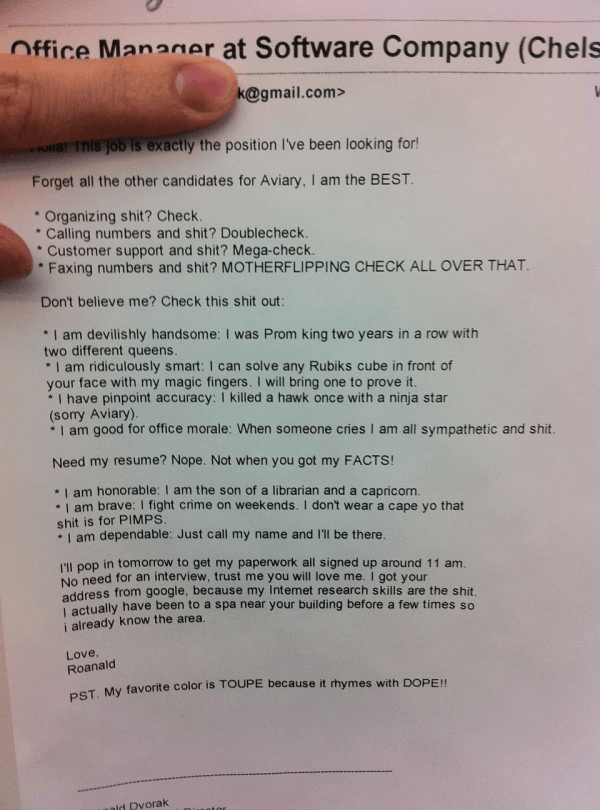
More on Cover Letters: Reading, Resources, Examples, Etc.
- On Cover Letters, in Résumés, Cover Letters, Thank You Letters, from Middle Georgia State University’s Career Services
- How to Write a Cover Letter in 5 Easy Steps, from Balance Careers
- 7 Cover Letter Mistakes That Make Hiring Managers Cringe, from The Muse
- These Are the Cover Letter Mistakes That Keep You From Getting an Interview, from LifeHacker
- Common cover letter mistakes new job seekers make, from The Ladders
How/Where Did You Learn about this Position?
| You write: “…. accept my resume and materials as my application for the Creative Services Writer Producer position as found on Google jobs.” | You write: “…. accept my resume and materials as my application for the Creative Services Writer Producer position at Palm Beach Gardens ABC affiliate, WPBF 25, as found on Hearst’s website’s career pages (url job code 2023832)” |
| What they hear: “I want a job (any job), and while i was searching for lots of jobs, I found a job at your company.” | What they hear: “I want a job at Hearst, and while i was looking for jobs at Hearst/WPBF 25, I found the Creative Services Writer Producer position at the Palm Beach Gardens ABC affiliate.” |
 |
 |

